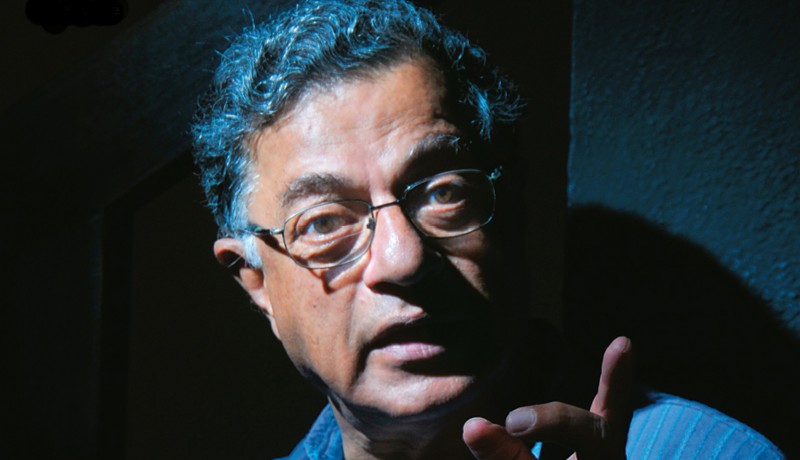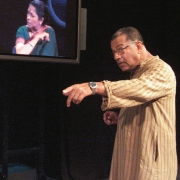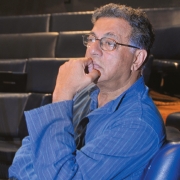
People

His latest play Wedding Album has finally arrived on stage, 40 years after he first penned it. Actor, director and playwright Girish Karnad steps out from behind the scenes in an interview with Rajashree Balaram
The café outside Prithvi Theatre in suburban Mumbai is buzzing. Struggling actors and writers are huddled together at the tables blowing lazy smoke-rings into an air already thick with humidity. I am halfway through my second cup of masala chai when Girish Karnad walks in—right on time. Despite the cacophony, I can discern the subtle nudges and whispers triggered by his arrival. Even dressed in a simple blue cotton kurta, his natural charisma is tough to downplay.
At 70, he doesn’t look his age, though he looks slightly frazzled having come straight from the airport—he has flown in from Bengaluru to join other theatre luminaries to felicitate director Satyadev Dubey, the doyen of Indian theatre. “I’ll have whatever you’re having,” he says, depositing his leather laptop case on the table. As I place the order for chicken patties and chai I can’t help but wonder if my choice is slightly plebeian for this celebrated playwright and uncommon man.
Critics, however, argue that his latest offering Wedding Album is as common as it gets. The play, which is travelling all over India and will soon go abroad, centres on a wedding in a middle class family. Beneath the bonhomie, old insecurities simmer to the surface revealing the hidden layers in each person. Juicy, all right, critics carp; but not as thought provoking as his earlier works. Typically, it doesn’t faze him.
Karnad’s first play Yayati, which won him the Mysore State Award in 1962, reflected on the emotional intimidation of the young by the old through the story of king Yayati who, to escape the curse of premature old age, asks his son Puru to bear his ordeal. Yayati illustrated the influence of the yakshagana performances that Karnad had seen while growing up in Sirsi in rural Karnataka. It also mirrored his own inner tug-of-war—a freshly minted Rhodes scholar wanting to explore the world and the son of a Chitrapur Saraswat Brahmin family caught in familial ties.
His second play Tughlaq moved away from the self to accommodate the upheaval of the world around him with the story of Mohammad Bin-Tughlaq whose lofty aspirations for his kingdom festered into a reign of tyranny. The play won Karnad the Sangeet Natak Akademi Award in 1964.
Yet it was Hayavadana in 1972 that showcased the genius in him. Based on a story from 11th century Kashmiri author Somadeva’s Vetalapanchvimshika and German novelist Thomas Mann’s The Transposed Heads, it questioned the crux of man’s identity: Is it his mind or is it his body? Later, Nagamandala, with its tale-within-a-tale plot based on two Kannada folktales and Agni Mattu Male on the torment of human choices, were also applauded both nationally and internationally.
“His plays may be anchored in mythology but they are written in a manner that helps us reinterpret our times,” says film director Saeed Mirza. Mirza was a student at the Film and Television Institute of India (FTII) in Pune when Karnad was the director of the institute in the mid-1970s. Those were turbulent years when FTII witnessed its earliest student unrest. He can’t forget the bitter face-off between students and Karnad. “He was immensely stoic against all the demands that we put him through.”
Stoic he still is but conventional he isn’t. Although Wedding Album may make us wonder whether he is finally learning to play safe after his mythological spectacles, his political stance shows that Karnad only does and says what he believes in. In 2004, he stepped down from the jury of the Mumbai International Film Festival when 30 films were rejected purely because of their controversial political content. Whether it was condemning the demolition of Babri Masjid, speaking out against the political manipulation of communal tensions on the Idgah Maidan controversy in Bengaluru or voicing his opinion on the Kaveri river issue, Karnad does it all without ever sitting on the fence.
I am still talking to him when head of Prithvi Theatre Sanjna Kapoor approaches our table to greet Karnad with a warm hug. As budding theatre actors train their mobile phone cameras at him, he smiles. I couldn’t help but remember what he had once said in an interview: “The playwright always carries his audience within him.”
EXCERPTS FROM THE INTERVIEW:
Harmony: You don’t look 70.
Karnad: Probably because I am not one of those people who thinks the world is going to the dogs [laughs]. I think the world is a very exciting place right now… the technology and the explosion of ideas and opportunities makes me wish I was younger! Instead of feeling left behind, I prefer to look at the younger generation as my rivals—that spurs me on to think ahead of time and stay young at heart.
How do you view ageing?
Luckily I come from a family that’s blessed with longevity—my father passed away at 92, and my mother died when she was 96. Neither of them suffered from any major ailments, nor do I. I enjoy the experience but I am not too sure if I want to live that long. I belong to a generation that believed in taking care of their parents in their old age. I don’t think it’s fair to expect that from my children. Today children lead such hectic lives—often far removed from their parents.
Your outlook towards the youth is reflected in Wedding Album…
The idea sprang up 40 years ago with my sister’s wedding. Of course, weddings today are different—now even if two people are living in different countries, they have already known each through email, SMS and Internet chat. Nevertheless, the turmoil created in a family when a daughter gets married—the tensions, the sadness, and the insecurities—remains the same.
It must be gratifying to finally see it on stage…
I finished writing Wedding Album only a couple of months ago as I had to renovate it to suit contemporary reality. Lilette Dubey, who directed the play, was not happy with the way it ended on stage. So we bounced ideas and came up with a new ending.
Are you at times disappointed with the director’s interpretation of your work?
There is no such thing as the playwright’s interpretation. The more interpretations there are, the better the play. Different directors approach things differently and stress on different nuances. Look at the different interpretations of Hamlet.
Your detractors feel your plays are based on arcane myths.
Bikhre Bimb is not about arcane myths. Nor is Wedding Album. I have been condemned of being far removed from contemporary reality. But then people are always eager to slot you.
Don’t you ever feel compelled to direct your own plays?
When I was in college, I excelled at everything: painting, poetry, singing, music, acting. At 18, I decided to give up painting because I knew I could only be a good painter—not a great one. At 22, I gave up the idea of becoming a poet because I don’t believe in wasting time doing something at which I will only be mediocre; I much prefer being the best at whatever I do. Similarly, I know that I am a reasonably good director but I am not among the best. I am happiest being a playwright—it’s a process that consumes me.
Yayati, which you wrote at the age of 23, mirrored your inner conflict of wanting to settle abroad after completing your studies in Oxford and returning to India. Do your plays often mirror your inner conflict?
It’s only in retrospect that I realised that Yayati mirrored my inner tug-of-war. We always borrow the most creative ideas from our own experiences. It need not always be a conflict though. It can be small elements of day-to-day life that are engraved into our subconscious and show up in our work.
You were commissioned to write plays for the Haymarket Theatre in London and the Guthrie Theatre in Minneapolis. What was the experience like?
The audience abroad loved Nagamandala but could not make sense of Bali, which is a more complex play steeped in our ethos. Though I would enjoy it if my plays went worldwide, at the end of the day every writer is able to do full justice when he writes for his native audience.
How was your stint at the Nehru Centre in London?
I enjoyed it thoroughly. I was exposed to such a variety of creative expressions. Any theatre, as long as it’s good theatre, should be savoured. For instance, I saw a Kabuki play recently when I had been to Japan. It was marvellous.
From a small village in Sirsi to Rhodes Scholar to film star to director of Nehru Centre in London, how do you balance your middle-class upbringing with your modern worldview?
It has lot to do with the generation I belong to. Most of us have moved to cities after spending a significant part of our lives in villages. So it’s easy to stay rooted to ground realities. I am proud to be part of a generation that has been witness to the most radical era in Indian history.
People generally consider Delhi and Mumbai to be vibrant when it comes to theatre. Do you feel isolated in Bengaluru?
I shifted to Bengaluru in the 1980s for my children’s education. My wife Saraswati [a doctor; she also runs an NGO] and I felt Mumbai was becoming far too crowded. Most schools had 80 children per class at the primary level. We were very keen to provide our children the best education. I gave up my career in films, but I have no regrets, and shifted to Bengaluru to enroll my children at Rishi Valley School. I do miss the vibrant theatre scene in Mumbai, but I don’t miss the city as much. I would have preferred living in Pune.
Do you think Mumbai has changed since you left the city?
Completely. I was in Mumbai in the 1960s and 1970s. I lived in my father’s flat in Mahim. Most of my theatre friends were close by. We would congregate at a hall in Tardeo in the heart of Mumbai where an industrialist had offered space to Satyadev Dubey for rehearsals. We would get drunk and argue about how theatre should be. Everyone in theatre who had nowhere to go would land up there. Those were exciting times as colour television still had not arrived on the scene. Theatre still mattered to a lot of people back then.
In the preface to your book Nagamandala, you mentioned that Satyadev Dubey rebuked you when you first met him as he assumed you wrote in English. How has the relationship endured over the years?
He was not aware that I wrote in Kannada. We’ve been at each other’s throats often enough [laughs]. It’s also because he is so passionate about theatre. At 74, he is full of ideas and an inspiration to actors and directors.
Do you get in touch with your friends from the film industry when you are in Mumbai?
Well, Prithvi Theatre is my favourite hangout in Mumbai. I have very few friends in the film industry: Shyam Benegal, Naseeruddin Shah, Rohini Hattangady, Kulbhushan Kharbanda… we were part of the same movement. I did not network much, because I acted in films only to earn a living. If I could earn money by writing plays, I would never have been an actor.
Do you think theatre is more lucrative now?
For people who are prolific, yes. For instance, Lilette Dubey’s group is doing three plays a day and may even soon stage Wedding Album abroad. That’s the kind of theatre I could never have dreamt of.
Has the audience evolved over the years?
The audience has evolved in different ways. Films are so slick these days. Now when I see my own films from the 1970s, I am embarrassed at the quality of editing… it’s so slow—what we thought was artistic. The audience back then took longer to absorb a scene. Now they’re used to fast cuts, thanks to TV. As for theatre, the traffic is so terrible in the city that people don’t want to come home from work and then step out again to watch a play.
Have you given up acting?
I have given up professional acting, unless someone offers me an intriguing role. These days, I am shooting for Nagesh Kukunoor’s Ashayein. I’d like to act in a film if the role is big and if they are willing to pay well—which they are not because I am not a big star. Then again, it thrills me that people still think of casting me in a role. An hour ago, a young director approached me with a role in a film that he is planning to make shortly.
People liked you a lot in Swami where you played a sensitive, undemanding husband.
Oh yes, Swami was quite a hit. Before it was released I would jokingly tell my wife, whom I was courting then, that I would become every college girl’s heartthrob. Well, I did manage to become that briefly and also ended up becoming a father figure of sorts [laughs].
One of your earliest plays Tughlaq was an allegory on the politics of the Nehruvian era. Aren’t you inspired to write a play on contemporary politics?
I did not consciously try to reflect the politics of the Nehruvian era in Tughlaq, though as a product of those times I am sure I must have been influenced in some way by what was happening around me. If you are responsive to what is happening around you, it’s bound to reflect in your work, though not necessarily in a way that you have experienced it.
It must have been very difficult when you faced public resentment on your stand on the Kaveri river issue recently.
There was a neutral body sitting on a judgement cogitating for 17 years. And then they pass a referendum, which is immediately criticised as anti-Karnataka. Then why elect a neutral body in the first place? There were many who agreed with my viewpoint but did not have the courage to say it aloud. I did and they burnt my effigies and stoned my house. I had to seek police protection and was confined to my house for over 40 days. They generated all the media hype to gain publicity. Now that the elections are over, everyone’s forgotten the issue. Well, good luck to them.
The female characters in your plays are bold, even defiant. Are you a feminist?
I was surprised when after Hayavadana, Satyadev Dubey remarked that I was the first Indian playwright to have not condemned a woman for adultery. I don’t think I am a feminist. In my family, female emancipation was the norm; no one really thought much about it. My mother was widowed at 19 and she later married my father in 1931. As I lived in a joint family surrounded by female cousins it was natural to be sensitive to female concerns. Look at Shyam Benegal—he has six sisters. No wonder he knows his women so well.
Who is your worst critic?
It’s important to have a core group of critics whose opinions you take seriously. For me, it’s my family and a few friends. And though my wife is very forthright with her views, my children are my worst critics—my son is a freelance journalist based in Delhi, and my daughter is a doctor in England.
Mythology and more…
Yayati (1961)
The play illustrates the taut tension between old age and youth and drives home the human obsession for eternity.
Tughlaq (1964)
The descent of an over-ambitious Mughal king whose honourable intentions are overshadowed by his callous demeanour.
Hayavadana (1972)
The plot, borrowed from an ancient collection of stories in Sanskrit, ponders the equation between human identity and relationships.
Nagamandala (1988)
Akin to a matrushka doll, the tale within a tale urges the audience to look at societal mores in a new light.
Taledanda (1990)
A stark display of the descent of a civil, cultured society into anarchy and terror. Winner of the Sahitya Akademi Award.
The Fire and the Rain (1995)
A drought-stricken village provides the backdrop for an insightful study on greed, jealousy and violence.
The Dreams of Tipu Sultan (1997)
Commissioned by BBC Radio in 1997 to commemorate 50 years of Indian independence, The Dreams of Tipu Sultan looks into the secret aspirations of one of the most dynamic rulers in Indian history.
Bali (2002)
Based on the 13th century Kannada epic Yashodha Charite, Bali underlines the Jain philosophy of non-violence and shows us that the chasm between thought and action is not as wide as we presume.
Bikhre Bimb (2005)
Arundhati Nag plays a passable Kannada writer who ultimately gains fame after she ventures into English writing.
Flowers (2007)
A monologue on the life of a priest caught between his passionate love for a courtesan and his love for God.
Wedding Album (2008)
Members of a middle-class family congregate for the younger daughter’s wedding when old secrets, fears and jealousies bubble to the surface.
Photo: Vilas Kalgutker Featured in Harmony – Celebrate Age Magazine August 2008
you may also like to read
-
For the love of Sanskrit
During her 60s, if you had told Sushila A that she would be securing a doctorate in Sanskrit in the….
-
Style sensation
Meet Instagram star Moon Lin Cocking a snook at ageism, this nonagenarian Taiwanese woman is slaying street fashion like….
-
Beauty and her beast
Meet Instagram star Linda Rodin Most beauty and style influencers on Instagram hope to launch their beauty line someday…..
-
Cooking up a storm!
Meet Instagram star Shanthi Ramachandran In today’s web-fuelled world, you can now get recipes for your favourite dishes at….









